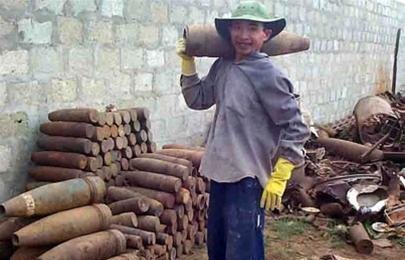While traders at a major scrap collection hub in the north-central Vietnamese province of Nghe An would previously accept just about any pieces of metal offered a decade ago, including bombs or warheads, they now seem more aware of the fact that they are ‘playing with death.’
The scrap market in Dien Hong Commune, Dien Chau District, has long been known as a ‘bomb market,’ where traders once busied themselves dismantling bombs for scrap metal and traded gunpowder, which earned them a healthy income.
Tuoi Tre (Youth) newspaper first reported on the dangerous and risky activity at the market in 2005, and decided to return earlier this week, in the wake of the deadly explosion that killed four in Hanoi on Sunday.
Ten years on, things have changed at the ‘bomb market,’ with people starting to understand how scary death is.
Twenty scrap houses at Dien Hong still accept bombs or explosive devices, but will examine their safety carefully to avoid accidents.
The iron ore facilities of Nguyen Tien Tan, Nguyen Hong Son and Chu Quang Hung were closed when a Tuoi Tre correspondent made an offer to sell some bomb cases.
The reporter finally managed to meet Tan, who hesitated for a while before refusing the offer.
 Few explosives are seen among the scrap at the 'bomb market'. Photo: Tuoi Tre
Few explosives are seen among the scrap at the 'bomb market'. Photo: Tuoi Tre
Some 100m away from Tan’s facility is the scrap house of a man only known as Dong ‘scrap metal,’ who accepted the bomb cases. He did however appear very cautious.
Dong said after Sunday’s explosion in Ha Dong, after which bomb-making materials were found, he only buys ‘cleaned bombs,’ referring to those with the explosive parts removed.
The scrap dealer said he now carefully checks if the explosives are ‘clean’ before paying for the scrap metal in cash.
He will then sell the materials to an iron ore processing facility in the northern province of Thai Nguyen.
The heart of the explosion in Ha Dong was reportedly in front of a scrap procurement shop, whose owner had been seen using a blowtorch to cut into the object before it went off.
“He was so careless,” Dong said, referring to the scrap dealer who was killed in the accident, even though there is no official conclusion about the case yet.
“The blowtorch increased the temperature of the bomb so it exploded.”
 A man dismantles bombs at the 'bomb market' in this 2005 file photo.
A man dismantles bombs at the 'bomb market' in this 2005 file photo.
Dong asserted that the method used at the ‘bomb market’ is more effective.
“Here we use hand saws, and water is repeatedly poured onto the bomb during the cutting process to cool it down, so you only need to be meticulous to get things done,” he said.
The scrap dealer did however admit that three people at the ‘bomb market’ had died in two separate incidents, while they were carelessly cutting warheads.
Dong said that there were times when he knew he had bought unsafe bomb cases or warheads.
“Obsessed by these accidents, I had to ask people to bury the explosive devices at the local riverside or graveyard, rather than dismantling them to get scrap materials,” he said.
Fewer bomb materials
Bui Dinh Huy, deputy chairman of the Dien Hong administration, said there had been three deadly accidents at the ‘bomb market’ in 2011, in addition to the three cases Dong recalled.
The facilities affected by the explosions had asked their employees to carefully examine the explosives, but the accidents still occurred, Huy said.
“Some were blinded and others had their legs broken, while the facilities themselves collapsed,” he added.
The commune chairman said the main cause of fatal accidents is the carelessness and negligence of the scrap dealers.
The problem is the scrap dealers are so blinded by the attractive incomes generated by selling bomb materials, according to the official.
They buy the bombs or warheads for only VND7,000 a kg, and then sell them on at ten times that price, Huy elaborated.
 Two men carries a bomb at the 'bomb market' in this 2005 file photo.
Two men carries a bomb at the 'bomb market' in this 2005 file photo.
The chairman added that people at the ‘bomb market’ are buying fewer dangerous scraps than they did ten years ago.
Many also said they are more afraid of dying after the Ha Dong explosion.
Local authorities have uncovered five cases in which scrap dealers disposed of warheads along the riverbank after knowing that they were unsafe and could explode.
“We had to retrieve the devices, fearing that other scrap collectors would take them home and cut them open,” he said.
Huy added the commune administration has repeatedly encouraged local scrap dealers not to buy dangerous materials, and to return the bombs or explosive devices they have bought to authorities.
“Those going against these requirements will be fined and lose their trading licenses,” he said.
Like us on Facebook or follow us on Twitter to get the latest news about Vietnam!





















































